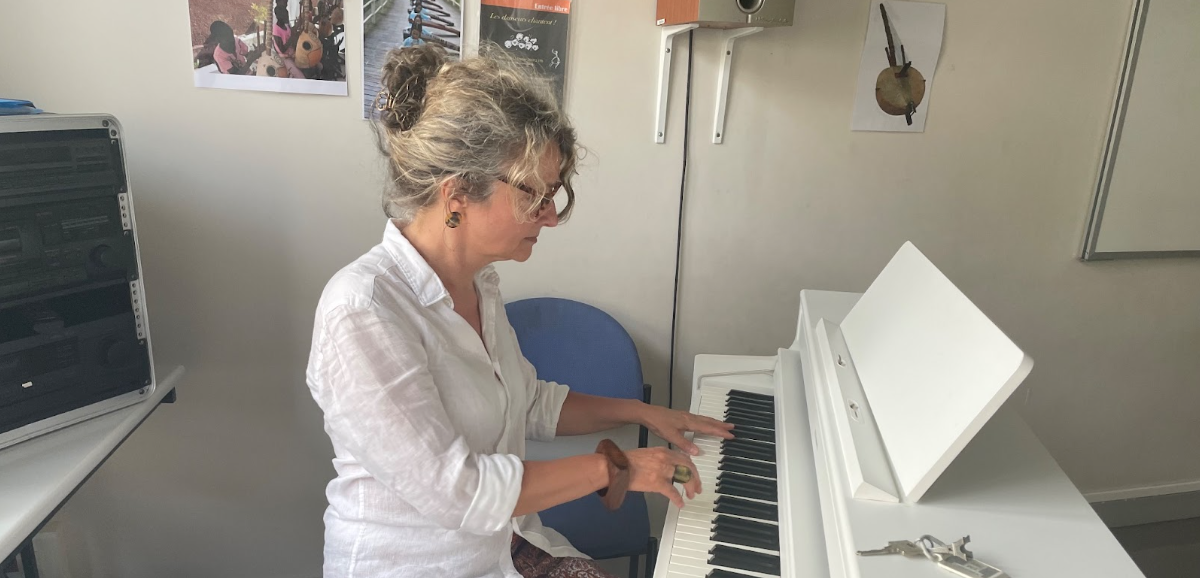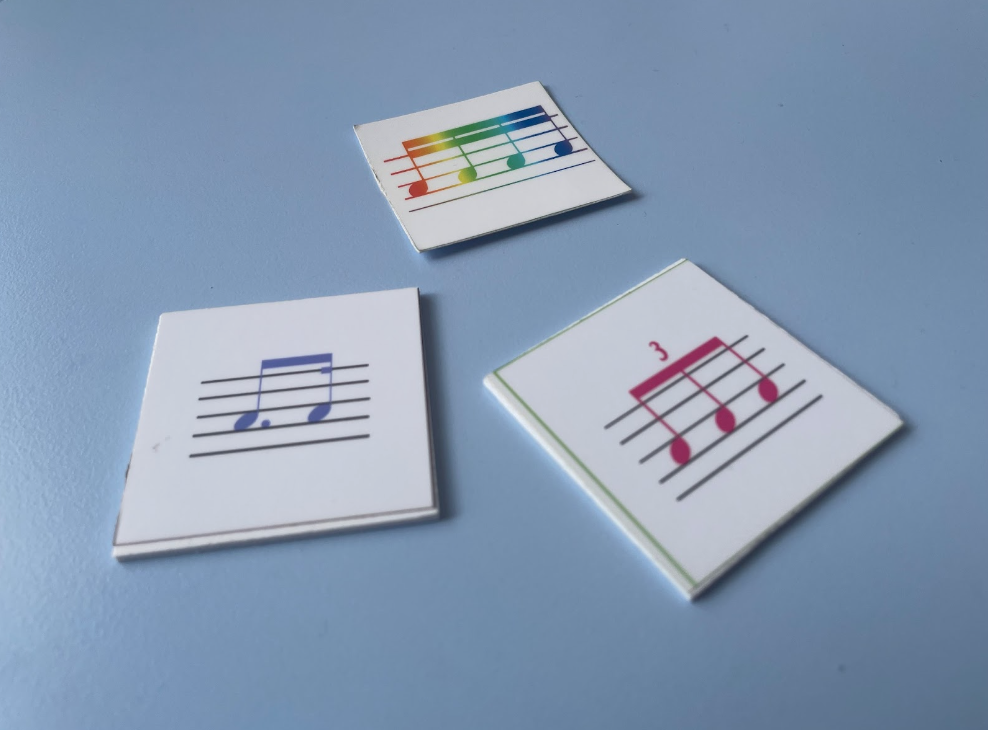At what age can you start learning music?
Interview with Isabelle Viennot, pianist and music teacher at the Conservatoire à Rayonnement Régional de la ville de Reims.
On June 21, we had the opportunity to chat with teacher Isabelle Viennot in one of her classrooms. A studious atmosphere on the day of the Fête de la Musique! A native of Reims and a long-standing teacher at the Conservatoire à Rayonnement Régional de Reims, she gives group lessons to apprentice musicians and dancers. Regularly confronted with very young pupils, Isabelle Viennot shared with us her views on music learning for beginner children. At what age can a child start learning and practicing music? Is music theory compulsory from the start? What are the first levers of learning? Isabelle Viennot sheds light on our desks...
How did you become a musician?
I started piano and solfège at the age of 8 at the Conservatoire à Rayonnement Régional de Reims. I was in a "classe à horaires aménagés", which enabled me to go to school in the morning, and spend the afternoon at the conservatory. I attended rythm from primary school through to high school.
I quickly became hooked on the group course (which I'm currently teaching), thanks to a great music theory teacher, Madame Monique Perlot, who introduced us to lots of new music and passed on her passion.
I entered the pedagogy class at the Conservatoire de Boulogne Billancourt and CNSMDP and trained for two years before passing the competitive examination. Once I had obtained my certificate of aptitude, I returned to Reims and replaced my former teacher Madame Perlot. Since then, I've been teaching musical training in group classes. For over ten years now, I've also been looking after future professionally-oriented musicians (COP). For beginners, I'm in charge of a group of CE1s with special music timetables, and many groups of dancers aged 7 to 14 with traditional timetables.
Is there an ideal age to start learning music?
There's no precise age. You can learn as a child, or as an adult. The key is to start at an age when you really want to take the plunge. After that, when you start at a very young age, you're more receptive. Children absorb like a sponge.
Things tend to fall into place more quickly than for an adult. The younger you are, the easier it is to integrate.
Is it compulsory to learn music theory before starting to play an instrument?
Personally, when I started music, back then you had to do a year of solfège before taking up the instrument. Today, at least at the Conservatoire de Reims, you start musical training (no longer called solfège) and instrumental practice at the same time. You don't need to have any prior knowledge to start playing an instrument.
For example, the little primary school musicians I accompany in CE1 are also beginners in instrument learning. They started with me in September in musical training, but also in instrument practice. It's up to the instrument teacher to adapt to the child and offer a tailor-made teaching approach.
In your opinion, is it possible to learn music completely independently?
I'm from the old school, so when I see distance learning piano lessons and tutorials... I'm not saying it's impossible, but it seems very difficult.
To use a score, you already have to be a reader, which means that you know how to sing what's in front of you, that you can hear it. It requires a particular, progressive approach. You can't just snap your fingers at home! Children don't just learn to read. They need to be taught how. But it's still possible, and the proof is in the pudding: there are plenty of kids out there practising this self-taught game. But what about the musical result?
What's a first music lesson like?
In the early-learning classes I give my little ones, there are really two parameters that I feel are essential: rythm and the singing voice. We start with rhythmic games in different tempi: repetition, memorization, invention, question/answer with the installation of the pulse... Sensory and bodily rhythmic work is very important, even indispensable, for the apprentice musician and dancer! At all levels. In the first classes, students stand up and we work on body rhythm. I show them rhythms where they're in a fixed position, but also moving around.
Before being able to read and write rhythms using sheet music, child instrumentalists need to hear, repeat and recognize them. Then they try to translate them by drawing.
Example: I sing "TaTa Taaaa-TaTa Taaaa-", in length, which I call "Morse" (short-short-long- short-short-long-...) and the aim is to get them to transcribe my singing in dots and dashes. (. ___ ..___ ) This technique generally amuses them a lot.
Once the children have grasped the concept, I show them what real musical writing looks like. I transform the dashes and dotted lines into formal language, such as "Two eighth notes black, Two eighth notes black". We write it down and then name it to integrate it gradually.
Do you use playful techniques to teach beginners?
I use a playful approach in my lessons. My husband has created little cards with all the rhythmic notions. Each child has a pile of cards gathered on the table, representing the rhythms they've learned after following the "short-short-long..." step seen earlier. They made the association, and we wrote it down.
Musical card game for children: each card is a rythm that can be used to create a rhythmic dictation, for example.
The concept is to play cards while practicing a rather complex exercise called "rhythmic dictation". See? In the form of a game. You manipulate and play while you work.
I also practice what I call "rhythmic screening". I write a rhythmic phrase on the board, and the children turn the writing into cards on their table. After repeating it internally, clapping their hands or reproducing it physically, I trap them! The children hear a slightly modified version of the phrase on the cards. The aim of the game? They have to find the error or errors.
Here, I've told you about rythm, but I also have cards that correspond to the notes C, D, E, F, G, A, B, C. They love these too!
Voice games are also a must for children. Knowing how to sing "just right" is a great way to hear what you're going to play or sing. Before playing a score, if the child can internalize what he's reading, if he can sing it, he gains stages in instrumental work and autonomy.
I practice a lot of breathing techniques and vocal games. I get them to play and sing along with the sound of mermaids, for example. We sing it, then I transcribe it on the board. For example, I draw a long arrow with little dots and the students imagine it vocally.
What advice do you give to young apprentices when they get discouraged?
I try to encourage my students as much as possible. Whether they're just starting out on the piano, guitar or any other instrument, I remind them that if they love what they're doing, they should keep learning slowly and they'll get there.
It's not easy. Parents think that everything is done in the same way as at school, but it's not the same. Learning music and an instrument requires real follow-up. Here, children learn for 1.5 hours a week, not every day. That's why we give them homework based on what they've learned in class. Children are not at all autonomous! Homework is less in vogue than it used to be. If the parents aren't there to support the youngsters, it's more complicated.
Do you have a teacher's anecdote to share?
One of my former students, who used to dance and play the piano and now has a real career as a concert musician, talked about me in a 2-hour interview for France Musique! In it, she talked about her life in Reims, where she encountered difficulties in piano lessons, and explained that two teachers really supported her, including me. That made me very happy!
💡 Pro tip: not everyone is called Mozart! Reviewing what's been seen in class at home is ideal for integrating notions seen in class more easily. The secrets of success: perseverance and hard work.
Are your children new to music? Help them practice between lessons with the Newzik ! The tool lets you find scores, annotate them and store them in a cloud.


